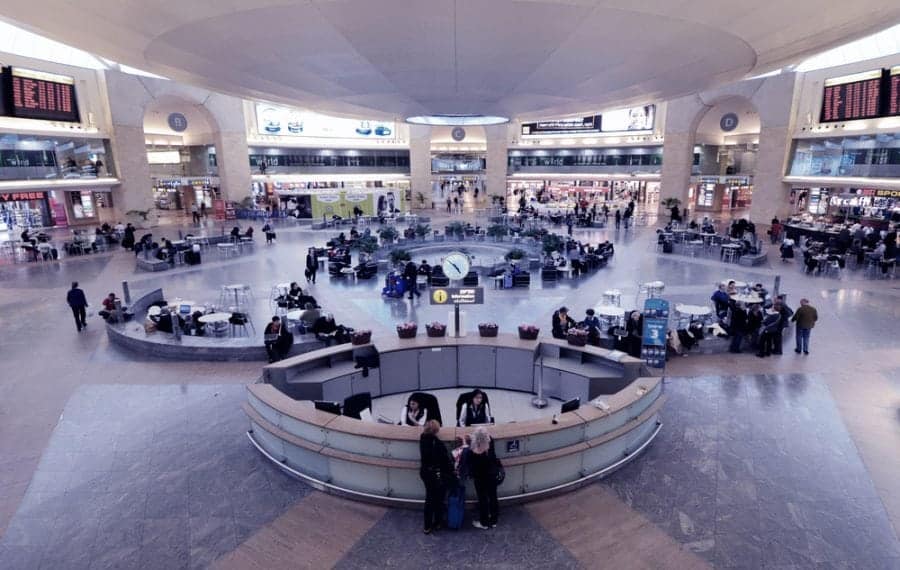Packing Checklist
How much you pack depends partially on how long you stay. In Israel, you’ll probably be moving around a lot and you won’t want to pack and unpack a lot of stuff. Generally, it’s a good idea to travel light and expect that you will need more room in your bags when you go home than when you left to accommodate gifts, dirty clothes and the tendency for clothes to take up more space on the return flight. Also, remember that the power supply is 220 volt AC-50 cycles. Make sure your electrical items can operate or purchase an adaptor kit (hotels sometimes can spare them).
you can purchase virtually anything you need during your stay, including clothing, cosmetics, and hygiene products.
If you are visiting Israel during the summer you will need lightweight clothing – short-sleeved and sleeveless shirts, shorts, sandals, beach shoes and a bathing suit. It’s also a good idea to pack a sweater or jacket, since nights in the mountains and the desert can be cool.
If you are visiting Israel in the winter, you will need warm clothing, a coat (preferably a raincoat as well), good shoes, an umbrella, gloves, a scarf and other warm clothing. Weather in Israel is not cold as it is in Europe, but days can be rainy and cold.
It’s a good idea to bring a small bag for day trips. If you are traveling to Eilat or the Dead Sea, it’s a good idea to bring a bathing suit, since it is warm enough to swim there even in the winter.
Sunscreen, a sun hat, and sunglasses are essential items throughout the year.
If you are planning on hiking, you will need good shoes and a lot of water, either in a canteen or in several bottles. You will need a sleeping bag, tent, and camping equipment only if you are planning on sleeping outdoors. Most youth hostels supply sheets and blankets.
Time
Israel is seven hours ahead of Eastern Standard Time, eight hours ahead of Central Time, nine hours ahead of Mountain Time and ten hours ahead of Pacific Time. It is two hours ahead of Greenwich Mean Time.
Dress & Manners
You can’t generalize anymore about Israelis than any other people. You’ll find good and bad. As a visitor, you should always be courteous, even if you encounter a native who is not.
Unless you specifically go to Arab neighborhoods, most Arabs you meet will probably be working in Israeli hotels or merchants. If you do go to Arab towns in Israel or the territories, you will find they are typically very hospitable and likely to invite you into their homes for tea and a bite to eat. Some may be comfortable talking about politics, others may not. Be a good guest.
Dress in Israel is casual. Even Israeli prime ministers frequently wear short-sleeve shirts without ties. You’ll notice the checklist has a variety of apparel. You’ll need warm clothes during winter months. If you plan to go to religious shrines or services, you should bring nice clothes. Jewish holy places usually allow you to enter with shorts, but the shrines of other faiths often require more modest dress. This is true also in religious Jewish neighborhoods where women, especially, are expected to wear sleeves below the elbow and skirts below the knees. One alternative is to carry a shawl that you can wrap around your shoulders or bare legs, or a wrap skirt to cover your shorts. Regardless of your personal views, respect those of the people who live there and you will have no trouble.
Weather
Israel enjoys long, warm, dry summers (April-October) and generally mild winters (November-March), with somewhat drier, cooler weather in hilly regions, such as Jerusalem and Safed. Rainfall is relatively heavy in the north and center of the country with much less in the northern Negev and almost negligible amounts in the southern areas. Regional conditions vary considerably, with humid summers and mild winters on the coast; dry summers and moderately cold winters in the hill regions; hot dry summers and pleasant winters in the Jordan Valley and year-round semi-desert conditions in the Negev.
Food
Israel has great food. Most people are probably familiar with falafel — fried ground chick peas served with salad in pita. Meat eaters will love shwarma, lamb sliced off a spit and served in pita (similar to gyros). Both are cheap, filling meals. Lots of other Mediterranean specialties like shishlik (shish kebab), baklawa (sweetmeat made of dough, honey, and nuts) and moussaka (baked eggplant, minced meat, onion and parsley) will stimulate your taste buds. The Americanization of Israel also means you’ll find such familiar names as McDonald’s, Burger King, Pizza Hut and Dunkin’ Donuts.
The water in Israel is safe to drink; nevertheless, it is different from what you are used to and people with sensitive stomachs may want to stick to bottled water. Also, Israelis don’t usually put ice in their drinks, so if you want some, ask for kerakh.
Keep in mind that not everything in Israel is kosher. Restaurants that are kosher serve either dairy or meat and close on Shabbat. The restaurant should have a Teudat certificate either in the window or available for inspection. Unless the menu or check says otherwise, tips are not included.
Safety
Forget what you’ve read in the papers or seen on TV; Israel is a very safe place to visit. You are far more likely to run into trouble in any major U.S. city than anywhere in Israel. Behave in Israel the way you would in those cities. Be careful where you go at night and travel in groups when possible. Generally, it is safe in most places in Israel to walk alone at night. The territories are a different story. It is advisable only to go into Gaza or the West Bank in a group and with an Israeli guide.
One of the first things you’ll notice when you arrive in Israel is the number of people carrying guns. It can be disconcerting. Soldiers carry them on the streets, in cars and on buses. Soldiers are required to keep their weapons with them, and since so many Israelis are on duty, it is common to stand next to someone on the bus with an Uzi hanging around their neck. You’ll quickly get used to it and realize it’s a fact of life in Israel and nothing to fear.


